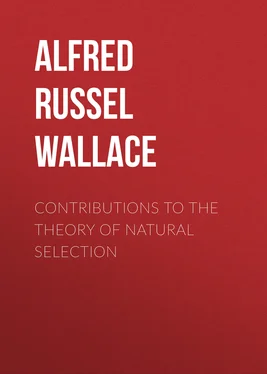Alfred Wallace - Contributions to the Theory of Natural Selection
Здесь есть возможность читать онлайн «Alfred Wallace - Contributions to the Theory of Natural Selection» — ознакомительный отрывок электронной книги совершенно бесплатно, а после прочтения отрывка купить полную версию. В некоторых случаях можно слушать аудио, скачать через торрент в формате fb2 и присутствует краткое содержание. Жанр: foreign_prose, foreign_edu, foreign_antique, на английском языке. Описание произведения, (предисловие) а так же отзывы посетителей доступны на портале библиотеки ЛибКат.
- Название:Contributions to the Theory of Natural Selection
- Автор:
- Жанр:
- Год:неизвестен
- ISBN:нет данных
- Рейтинг книги:4 / 5. Голосов: 1
-
Избранное:Добавить в избранное
- Отзывы:
-
Ваша оценка:
- 80
- 1
- 2
- 3
- 4
- 5
Contributions to the Theory of Natural Selection: краткое содержание, описание и аннотация
Предлагаем к чтению аннотацию, описание, краткое содержание или предисловие (зависит от того, что написал сам автор книги «Contributions to the Theory of Natural Selection»). Если вы не нашли необходимую информацию о книге — напишите в комментариях, мы постараемся отыскать её.
Contributions to the Theory of Natural Selection — читать онлайн ознакомительный отрывок
Ниже представлен текст книги, разбитый по страницам. Система сохранения места последней прочитанной страницы, позволяет с удобством читать онлайн бесплатно книгу «Contributions to the Theory of Natural Selection», без необходимости каждый раз заново искать на чём Вы остановились. Поставьте закладку, и сможете в любой момент перейти на страницу, на которой закончили чтение.
Интервал:
Закладка:
Perhaps the most remarkable instance of an immense bird population is that of the passenger pigeon of the United States, which lays only one, or at most two eggs, and is said to rear generally but one young one. Why is this bird so extraordinarily abundant, while others producing two or three times as many young are much less plentiful? The explanation is not difficult. The food most congenial to this species, and on which it thrives best, is abundantly distributed over a very extensive region, offering such differences of soil and climate, that in one part or another of the area the supply never fails. The bird is capable of a very rapid and long-continued flight, so that it can pass without fatigue over the whole of the district it inhabits, and as soon as the supply of food begins to fail in one place is able to discover a fresh feeding-ground. This example strikingly shows us that the procuring a constant supply of wholesome food is almost the sole condition requisite for ensuring the rapid increase of a given species, since neither the limited fecundity, nor the unrestrained attacks of birds of prey and of man are here sufficient to check it. In no other birds are these peculiar circumstances so strikingly combined. Either their food is more liable to failure, or they have not sufficient power of wing to search for it over an extensive area, or during some season of the year it becomes very scarce, and less wholesome substitutes have to be found; and thus, though more fertile in offspring, they can never increase beyond the supply of food in the least favourable seasons.
Many birds can only exist by migrating, when their food becomes scarce, to regions possessing a milder, or at least a different climate, though, as these migrating birds are seldom excessively abundant, it is evident that the countries they visit are still deficient in a constant and abundant supply of wholesome food. Those whose organization does not permit them to migrate when their food becomes periodically scarce, can never attain a large population. This is probably the reasons why woodpeckers are scarce with us, while in the tropics they are among the most abundant of solitary birds. Thus the house sparrow is more abundant than the redbreast, because its food is more constant and plentiful,—seeds of grasses being preserved during the winter, and our farm-yards and stubble-fields furnishing an almost inexhaustible supply. Why, as a general rule, are aquatic, and especially sea birds, very numerous in individuals? Not because they are more prolific than others, generally the contrary; but because their food never fails, the sea-shores and river-banks daily swarming with a fresh supply of small mollusca and crustacea. Exactly the same laws will apply to mammals. Wild cats are prolific and have few enemies; why then are they never as abundant as rabbits? The only intelligible answer is, that their supply of food is more precarious. It appears evident, therefore, that so long as a country remains physically unchanged, the numbers of its animal population cannot materially increase. If one species does so, some others requiring the same kind of food must diminish in proportion. The numbers that die annually must be immense; and as the individual existence of each animal depends upon itself, those that die must be the weakest—the very young, the aged, and the diseased—while those that prolong their existence can only be the most perfect in health and vigour—those who are best able to obtain food regularly, and avoid their numerous enemies. It is, as we commenced by remarking, “a struggle for existence,” in which the weakest and least perfectly organized must always succumb.
The Abundance or Rarity of a Species dependent upon its more or less perfect Adaptation to the Conditions of Existence
It seems evident that what takes place among the individuals of a species must also occur among the several allied species of a group,—viz., that those which are best adapted to obtain a regular supply of food, and to defend themselves against the attacks of their enemies and the vicissitudes of the seasons, must necessarily obtain and preserve a superiority in population; while those species which from some defect of power or organization are the least capable of counteracting the vicissitudes of food-supply, &c., must diminish in numbers, and, in extreme cases, become altogether extinct. Between these extremes the species will present various degrees of capacity for ensuring the means of preserving life; and it is thus we account for the abundance or rarity of species. Our ignorance will generally prevent us from accurately tracing the effects to their causes; but could we become perfectly acquainted with the organization and habits of the various species of animals, and could we measure the capacity of each for performing the different acts necessary to its safety and existence under all the varying circumstances by which it is surrounded, we might be able even to calculate the proportionate abundance of individuals which is the necessary result.
If now we have succeeded in establishing these two points—1st, that the animal population of a country is generally stationary, being kept down by a periodical deficiency of food, and other checks ; and, 2nd, that the comparative abundance or scarcity of the individuals of the several species is entirely due to their organization and resulting habits, which, rendering it more difficult to procure a regular supply of food and to provide for their personal safety in some cases than in others, can only be balanced by a difference in the population which have to exist in a given area —we shall be in a condition to proceed to the consideration of varieties , to which the preceding remarks have a direct and very important application.
Useful Variations will tend to Increase; useless or hurtful Variations to Diminish
Most or perhaps all the variations from the typical form of a species must have some definite effect, however slight, on the habits or capacities of the individuals. Even a change of colour might, by rendering them more or less distinguishable, affect their safety; a greater or less development of hair might modify their habits. More important changes, such as an increase in the power or dimensions of the limbs or any of the external organs, would more or less affect their mode of procuring food or the range of country which they could inhabit. It is also evident that most changes would affect, either favourably or adversely, the powers of prolonging existence. An antelope with shorter or weaker legs must necessarily suffer more from the attacks of the feline carnivora; the passenger pigeon with less powerful wings would sooner or later be affected in its powers of procuring a regular supply of food; and in both cases the result must necessarily be a diminution of the population of the modified species. If, on the other hand, any species should produce a variety having slightly increased powers of preserving existence, that variety must inevitably in time acquire a superiority in numbers. These results must follow as surely as old age, intemperance, or scarcity of food produce an increased mortality. In both cases there may be many individual exceptions; but on the average the rule will invariably be found to hold good. All varieties will therefore fall into two classes—those which under the same conditions would never reach the population of the parent species, and those which would in time obtain and keep a numerical superiority. Now, let some alteration of physical conditions occur in the district—a long period of drought, a destruction of vegetation by locusts, the irruption of some new carnivorous animal seeking “pastures new”—any change in fact tending to render existence more difficult to the species in question, and tasking its utmost powers to avoid complete extermination; it is evident that, of all the individuals composing the species, those forming the least numerous and most feebly organized variety would suffer first, and, were the pressure severe, must soon become extinct. The same causes continuing in action, the parent species would next suffer, would gradually diminish in numbers, and with a recurrence of similar unfavourable conditions might also become extinct. Tho superior variety would then alone remain, and on a return to favourable circumstances would rapidly increase in numbers and occupy the place of the extinct species and variety.
Читать дальшеИнтервал:
Закладка:
Похожие книги на «Contributions to the Theory of Natural Selection»
Представляем Вашему вниманию похожие книги на «Contributions to the Theory of Natural Selection» списком для выбора. Мы отобрали схожую по названию и смыслу литературу в надежде предоставить читателям больше вариантов отыскать новые, интересные, ещё непрочитанные произведения.
Обсуждение, отзывы о книге «Contributions to the Theory of Natural Selection» и просто собственные мнения читателей. Оставьте ваши комментарии, напишите, что Вы думаете о произведении, его смысле или главных героях. Укажите что конкретно понравилось, а что нет, и почему Вы так считаете.












